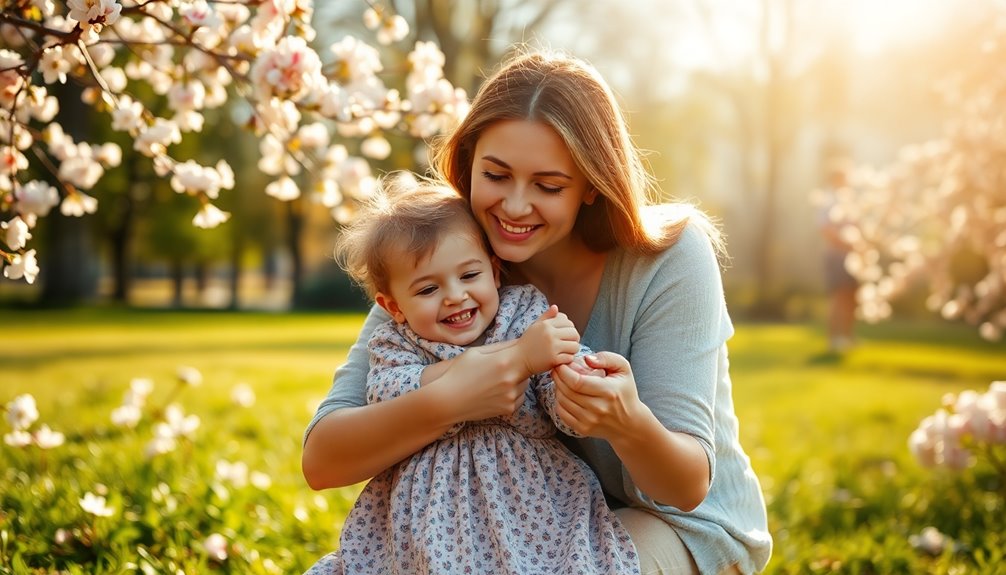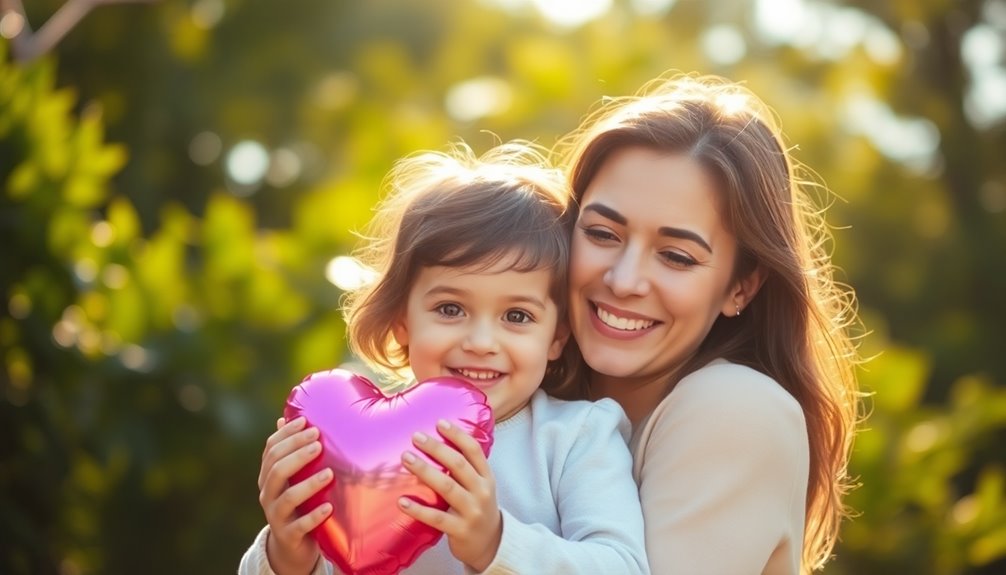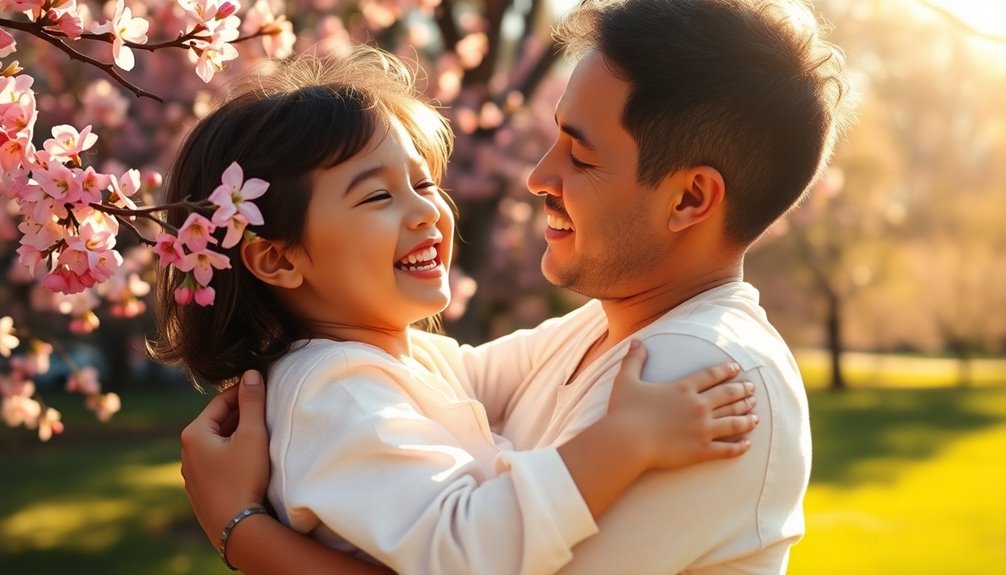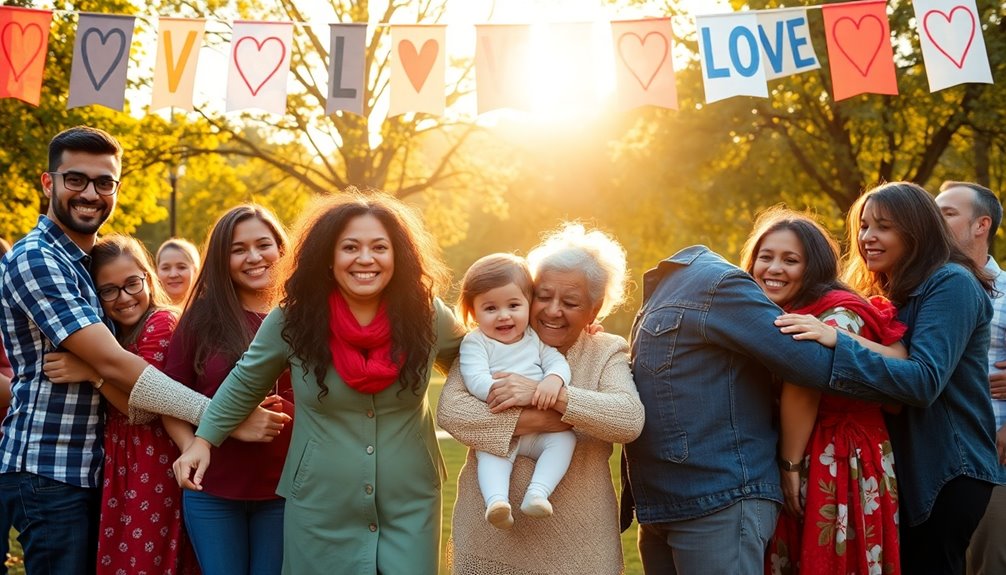Unconditional love opens a world of transformation for children. It shapes their emotional landscape and fosters resilience, boosting self-worth and reducing the risk of anxiety and depression. Through genuine connections, children learn essential coping skills and develop trust, nurturing healthier future relationships. Parental guidance plays a significant role in this process, teaching empathy and conflict resolution. If you're curious about the profound impacts of unconditional love, there's so much more to explore.
Key Takeaways
- Unconditional love fosters secure attachments, enhancing emotional health and future relationships.
- Genuine connections promote healing, improving mental resilience and fostering trust.
- Parental guidance shapes perceptions of love, influencing emotional security in adulthood.
- Resilience is nurtured through consistent love, leading to better coping skills and self-image.
- A supportive community centered on unconditional love cultivates personal growth and stronger relationships.
The Essence of Unconditional Love in Child Development

Unconditional love is the cornerstone of healthy child development, shaping not just behaviors but the very essence of a child's emotional landscape. When you provide this type of love, you're fostering secure attachments that lead to healthier relationships in their future.
I'd recommend prioritizing these loving connections, as they greatly reshape children's lives, boosting their resilience and self-worth. Research shows that kids raised in loving environments are less likely to struggle with anxiety and depression, highlighting the critical role of emotional support during formative years.
Furthermore, the nurturing nature of unconditional love enhances cognitive and social development, allowing children to excel academically and interpersonally. By embracing unconditional love, you're investing in a brighter future for your child.
Transforming Emotional Pain Through Genuine Connection

While you might feel overwhelmed by emotional pain, genuine connection can serve as a powerful catalyst for healing. Supportive relationships greatly improve your mental health and resilience, allowing you to confront and release those childhood wounds that contribute to your suffering.
The Real Love® framework highlights how unconditional love plays an essential role in this process. Engaging in open and honest communication fosters trust, which is vital for overcoming emotional struggles.
When you acknowledge and validate each other's feelings, you create a safe space for healing. By nurturing loving connections, especially in childhood, you can develop better emotional regulation and coping mechanisms, ultimately transforming your emotional pain into personal growth and deeper connections. Additionally, developing a growth mindset can significantly enhance your ability to thrive amidst emotional challenges.
The Impact of Parental Guidance on Love and Relationships

The way parents guide their children shapes how they understand love and form relationships later in life. When you receive consistent and loving support, you're more likely to develop secure attachments, paving the way for healthier romantic relationships as an adult.
Your parents' expectations and their communication about relationships greatly influence your views on love and the choices you make. Positive role models in parenting teach you about unconditional love, empathy, and conflict resolution—skills essential for successful relationships. Additionally, parents who stress values and respect help you navigate challenges, steering you away from unhealthy romantic dynamics. This strong foundation instills confidence in your ability to form meaningful connections, ensuring you can build lasting, loving partnerships. Furthermore, dynamic communication exercises can enhance understanding and connection between partners, leading to more fulfilling relationships.
Nurturing Resilience: The Role of Love in Healing

When a child receives consistent love and support, it lays the groundwork for resilience and healing. Unconditional love creates a secure emotional base that enhances their mental health and well-being.
The 1952 World Health Organization report emphasizes that loving connections shape children's behaviors and overall development. By addressing childhood wounds through Real Love® principles, you can foster healing and personal growth, leading to improved resilience.
Studies show that children with consistent love are more likely to develop essential coping skills and a positive self-image, helping them navigate life's challenges. When you promote an environment of unconditional love, you greatly reduce stress and emotional pain, enabling children to thrive and form healthy relationships as they grow. Additionally, fostering nurturing environments can significantly mitigate the long-term effects of trauma, promoting better emotional health in children.
Building a Community Around Unconditional Love and Support

Creating a community centered on unconditional love and support strengthens the foundations laid through personal relationships. Prioritizing loving connections not only boosts mental health but also nurtures child development, as highlighted in a 1952 WHO report. Supportive environments allow you to share experiences, fostering resilience and personal growth. Additionally, incorporating beetroot into baby's diet can be a great way to engage community members in discussions about nutrition and health for children.
| Community Initiatives | Benefits |
|---|---|
| Share personal stories | Encourages openness and connection |
| Celebrate individual achievements | Inspires others to adopt loving values |
| Collaborate on parenting challenges | Enhances family dynamics and support |
Frequently Asked Questions
What Are the Four Types of Unconditional Love?
There are four main types of unconditional love you'll encounter.
First, familial love, which provides security and belonging.
Next, romantic love, where passion connects you deeply with a partner, demanding emotional support.
Then, there's platonic love, offering companionship and support without romantic ties.
Finally, self-love is essential; it helps you recognize your worth and nurtures your well-being, forming a strong foundation for how you engage in all other types of love.
What Is a Good Quote for Unconditional Love?
A great quote for unconditional love is, "Unconditional love means loving someone without conditions, expectations, or limitations, allowing for true acceptance and understanding."
This captures the essence of what it means to truly love someone, embracing their flaws and supporting them through life's ups and downs.
When you practice this kind of love, you create a safe space for connection, fostering deeper relationships based on trust and genuine acceptance.
What Is the True Meaning of Unconditional Love?
When you think of unconditional love, it's like a timeless classic playing on repeat. It means loving someone without strings attached, focusing on their strengths and weaknesses alike.
You embrace their flaws while encouraging their growth, showing patience through challenges. This kind of love isn't about perfection; it's about connection, resilience, and acceptance.
You'll find that it fosters deeper relationships, allowing both you and your loved one to thrive emotionally and spiritually.
What Does the Bible Say About Unconditional Love?
The Bible speaks profoundly about unconditional love. It shows that God's love isn't based on your actions or worthiness; instead, it's freely given, as seen in Romans 5:8.
Jesus emphasizes loving God and your neighbor wholeheartedly, reflecting this love in your relationships.
The parable of the Prodigal Son illustrates a father's unwavering affection, demonstrating that true love forgives and accepts regardless of mistakes.
Essentially, you're called to embody this unconditional love in your life.
Conclusion
You might think unconditional love is just a nice idea, but it's a powerful force in child development. When you provide genuine connection and support, you're not only nurturing resilience but also transforming emotional pain into healing. Remember, your role as a parent or caregiver shapes future relationships. By fostering an environment of love, you'll be astonished at how it positively impacts not just your child, but the entire community around you.









